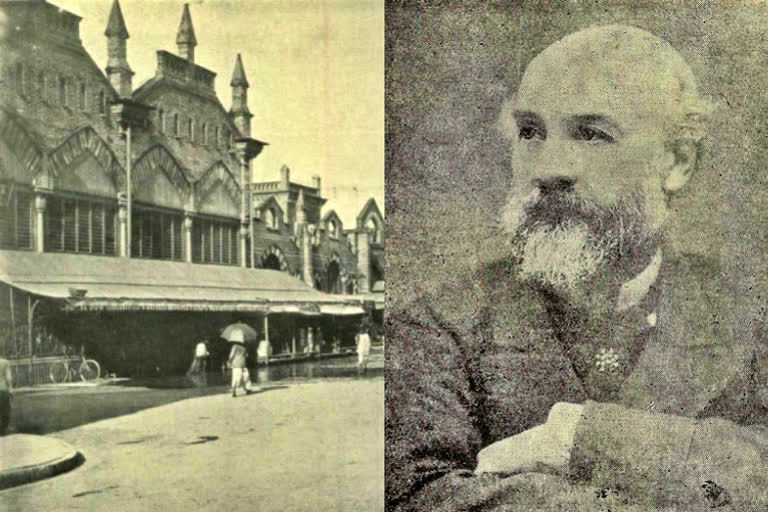Kolkata: Still staring at the paper in his hand, Stuart Hogg had no clue how to react. The then Kolkata Police Commissioner Stuart really didn’t understand how could one ever arrest oneself. The situation Stuart was in is unprecedented in Kolkata Police, if not in the history elsewhere ever since.
In one word, it was unimaginable. Let’s now elaborate on the background of Stuart Hogg. Stuart Saunders Hogg spent his student life at the elite Eton College on the banks of the Thames river. After completing his studies, Stuart came to India in 1853 and joined the Bengal Civil Service. He once sat in an important position in the administration of Bengal as the District Magistrate of Burdwan. There he earned a reputation for being an efficient administrator and was admired for his honest and generous spirit.
During the famine of 1865-66, the doors of Stuart’s office were left ajar to the public. At that time, he was credited for saving thousands of lives and had achieved a godly stature in the eyes of the general public.
Stuart Hogg undoubtedly deserved an award for handling administrative work with immaculate skills. Stuart came to Calcutta (now Kolkata) from Burdwan in the middle of 1866 with two big responsibilities — the first is the post of Police Commissioner and the other is the Chairman of Kolkata Municipal Corporation.
Stuart would devote his first half to set things in order at the Kolkata Police headquarters Lalbazar, while he spent the rest of the day at the Corporation’s head office at 8, Janbazar Street (later renamed to be Corporation Street and further as S.N. Banerjee Road), the seat of Corporation headquarters.
Let’s take a recess to talk about two milestones he achieved as the Chairman of the Municipal Corporation. It was his initiative to build a market in the heart of the city. Built on January 1, 1874, the market was first called Hog Saheb’s Market. After 28 years in 1903, it was officially named Stuart Hogg Market, but to the people of the city, it has only one identity —the New Market.
The second noteworthy one came as the Police Commissioner of Calcutta. Stuart was the creator of the Kolkata Police’s Intelligence Department. Stuart Hogg's knowledge of crime can be attributed to his education. He felt the need for a Crime Branch in Calcutta Police (now Kolkata Police).
However, he felt the need, particularly after an incident on April 1, 1868, when a gruesome massacre took place near the Amherst Street police station. An Anglo-Indian girl named Rose Brown was killed brutally, which created a huge uproar. An officer named Richard Reid became famous overnight after cracking the case by nabbing the killer of the young woman. Reid, by the way, is considered the first detective of Calcutta Police. In the investigation, Reid was assisted by Stuart Hogg. Later, in his book “Everyman his Own Detective”, Reid was effusive in his praise of Stuart Hogg.
Coming back to the story where the commissioner himself was in two minds about getting himself arrested. The time was when Hog had just come to India after a vacation in London and joined work. However, on the way back, there was a problem. His luggage was 'lost'. The entire Kolkata police was on tenterhooks when they learnt their head lost his luggage. The cops got down to business to find his lost bag of Stuart.
Finally, after a frantic search, the bag was found in Allahabad. The local magistrate issued a summon in the name of Stuart, the Chairman of the Calcutta Municipal Corporation (CMC). Stuart was told to appear in the Allahabad court to identify his bag and take it back. Stuart did not get time to go to Allahabad dogged with handling the responsibility of two key posts.
As a result, Stuart gave the date a skip and failed to appear before the magistrate. Another order was issued in his absence “Police Commissioner Stuart Hogg” of Calcutta was asked to arrest “Municipal Chairman Stuart Hogg” and produce the latter before the magistrate for further orders. Stuart was speechless when he received the copy of that strange order. Having faced more precarious situations, Stuart was never in such a spot of bother.
He knew well that disobeying the court order is tantamount to contempt of court. So, Stuart Hogg pulled off a bizarre solution. As Commissioner of Police, he issued an arrest warrant in the name of the Chairman of the Calcutta Municipal Corporation and then proceeded to Allahabad, "presumably of having arrested the latter”. The press would not let go of such a ridiculous situation. In 1871, the whole incident was described in the newspaper Hindu Patriot.
In the end, Stuart appeared in court with the request for protection. But the ending was not so good either. The exasperated magistrate ordered that the government would not bear a single penny of Stuart Hogg’s travel expenses from Calcutta to Allahabad. So the Chairman and Commissioner of CMC who arrested himself and had to bear the entire cost of travel, which of course costed dearly.



